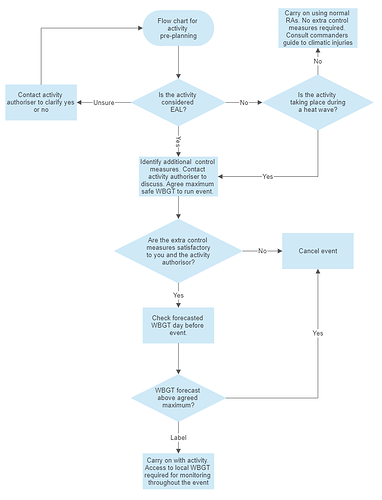IMHO, it’s just further evidence that the seniors of the organisation don’t have any understanding of the work required by CFAVs, nor of the impact that their poor decision making has on volunteers and the cadets for whom they are responsible.
To not even realise that a Friday release of a policy with the potential to stop events is a bad idea…
Shoddy, to say the least.
Yeah, it’s really not clear what actually needs to be done. Also not clear at what point things should be cancelled.
I quickly drew up this flowchart for how I see the policy when it comes to planning before an event:
I feel like this is specifically for the before event bit. Then during the event we’re meant to use the WBGT to guide how we implement the extra control measures that we came up with?
Do we class weather over 20 degrees a heatwave? That’s what the WRTs say
Honestly not sure. Half the problem here is there are no real definitions for anything.
There seems to be a reasonable definition in the UK for what constitutes a heatwave.
We don’t need to over complicate things, we have a government agency which deals with this sort of thing (The Met Office) therefore we should be using their definitions for everything.
If we go by their definition, then I’d question what it has to do with anything. 4 days in a row at 27 degress is a heatwave, but if we get 25,26,32,26 that it’s not. (Assuming in the South East) Yet if I’m running an activity on the third day only, then the first scenario is considered more serious than the second. Even though the second scenario I’d be working in 32C weather rather than 27C.
Which does make some sense, things like fatigue and dehydration are cumulative, so if it’s been 27 degrees all week the effects are going to be greater on day 4 than one day at 32 degrees would be.
You just asked for a definition; I never promised it would make things clearer ![]()
But isn’t acclimatisation also a factor at that stage?
Not according to the JSP as that says something about a structured programme of exercise.

Given climate change, that might need to be reconsidered soon.
Agreed. But you can acclimatise to a degree relatively quickly. That’s why teams have to be in Nijmegen from Saturday to march on Tuesday, to get used to the climate. (Which is usually hotter and more humid than the UK.)
Like it, can you change the top right hand box to “for gods sake stop trying to find an excuse to cancel something and get on with it”
Just read this in the heat injury guide:
RAFAC do not conduct physically demanding selection events and fitness tests.
How does this impact Junior Leaders? Surely they do a demanding selection event don’t they? I’m not involved so this is a genuine question I don’t know the answer to.
There’s a fitness test on ACLC too I believe.
You seem surprised by a basic error in a document which was clearly written by people who have no knowledge of this organisation?
There certainly was in the 1990s.
This is the full quote:
Policy Statement
3 In the case of physically demanding selection events and fitness tests, as well as considering the factors at Policy statement 2, the following factors must also be considered.
a. When planning an activity, a Wet Bulb Globe Thermometer (WBGT) forecast, and the work/rest tables must be used to inform the risk assessment.
b. When delivering the activity, a WBGT dynamic reading that is representative of the location of the activity must be used. For all other Defence activities, as well as considering the factors at Policy statement 2 the following factors should also be considered:
c. When planning an activity, a WBGT forecast, and the work/rest tables should be used to inform the risk assessment.
d. When delivering the activity, a WBGT dynamic reading that is representative of the location of the activity should be used.
- RAFAC do not conduct physically demanding selection events and fitness tests. As such Policy Statement 3a and b do not apply. However, a WBGT forecast will be used to assist planning. When planning activities where a risk of heat illness may be anticipated whether inside or outside, commanders must include weather forecasting in the planning stage of the risk assessment process. Full instructions are in ACP5, Leaflet 6.
